英语中的省略和替代
英语中的省略

英语中的省略为了避免重复,英语句子中某些部分可以省略。
常见的省略有以下几种:一、状语从句中的省略在时间、条件、让步及比较状语从句中,如主句和从句主语一致(或从句主语是it),且从句含be动词时,可将从句中的主语和be动词省略,从而构成“连词+ 分词/形容词/副词/介词”结构。
这里常见的连词有when/while/as/if/unless/once/although/though/than等。
When (water is )heated, water is turned into vapor. 水加热时变成气体。
He works very hard though(he is)rather weak. 他尽管体弱,但他十分努力地工作。
He came earlier than(he had been)expected. 他来得比预料的要早。
考例:①The research is so designed that once ____ nothing can be done to change it.A. beginsB. having begunC. beginningD. begun②If you go to Xi' an, you will find the palaces there more magnificent than commonly ___ .A. supposingB. supposedC. to supposeD. suppose分析:①D。
once后省略了the research is begun ②B。
比较状语从句中的完整形式是:than they are commonly supposed。
二、并列结构的省略1.并列结构一般由and, or, but等连接,他们可以连接单词、短语或分句,其中相同成分出现时可以被省略。
One of the sides of the board should be painted yellow, and ____.A.the other is whiteB. another whiteC. the other whiteD. another is white选C。
英语语法中的省略有哪些

英语语法中的省略有哪些英语是按照分布面积而言最流行的语言,但母语者数量是世界第三,仅次于汉语、西班牙语。
它是学习最广泛的第二语言,是近60个主权国家的官方语言或官方语言之一。
下面是店铺为大家收集的英语语法中的省略有哪些,欢迎阅读,希望大家能够喜欢。
英语语法中的省略有哪些一、并列复合句中某些相同成分的省略。
二、在when,while,if,asif,though(或although),as,until,once,whether,unless,where等连词连接的状语从句中,常省略跟主句相同的主语和be动词。
三、当见到“when(或if,where,wherever,whenever,assoonas,asfastas,than等)+possible/necessary等”时,可理解中间省略了itis(或was)。
四、有形式主语it的主语从句可省略that。
五、在限制性定语从句中可省略作宾语的关系代词whom,which,that。
六、在direction(方向),way(方式),distance(距离),time(时间),times(倍数)等后面所接的定语从句中常省略that,which,inwhich。
七、以therebe开头的句子,其主语的定语从句常可省略关联词,而therebe结构作定语从句时,省略作主语的关系代词。
八、命令句、惊叹句、部分第一人称的陈述句、部分问句和答句中省略最为常见。
九、用so,not或其它手段来省略上文或问句中的'一部分或整个句义。
小升初英语语法省略句知识点1. 省略句的定义省略是为了避免重复、突出新信息并使上下文紧密连接的一种语法修辞手段。
省略在语言中,尤其在对话中,是一种十分普遍的现象。
2.小品词的省略1)省略介词I ‘ ve studied English (for) five years. 我已学五年英语了。
2)省略连词thatI believe (that) you will succeed . 我相信你们会成功的。
高中语法进阶宾语从句的省略与替代

高中语法进阶宾语从句的省略与替代高中语法进阶:宾语从句的省略与替代导言:在学习英语语法的过程中,宾语从句是一个重要的概念。
它在句子中充当宾语的角色,用来陈述行为或者描述意愿、想法等。
而在宾语从句的使用中,省略与替代也是一种常见的技巧,能够使句子更加简洁、流畅。
本文将介绍高中语法进阶中的宾语从句省略与替代技巧,帮助学生更好地掌握英语语法知识并提高写作能力。
一、宾语从句的省略宾语从句的省略主要包括省略主语、省略谓语以及省略主语和谓语。
下面将详细介绍这三种情况的省略规则和例子。
1. 省略主语当宾语从句的主语与主句的主语相同,并且从句的谓语动词是可以省略的动词(如:think, believe, hope, say等)时,我们可以将从句的主语省略。
例:主句:He said (that) he would come to the party.宾语从句:(that) he would come to the party.省略后的句子:He said he would come to the party.2. 省略谓语当宾语从句的谓语动词与主句的谓语动词一样时,我们可以将从句的谓语动词省略。
这种情况下,需要注意宾语从句的主语与主句的主语是否一致。
例:主句:I know (that) he is a doctor.宾语从句:(that) he is a doctor.省略后的句子:I know he is a doctor.3. 省略主语和谓语当宾语从句中的主语和谓语都与主句相同,并且从句是一般疑问句或选择疑问句时,我们可以将主语和谓语省略。
例:主句:She doesn't know whether she should go or not.宾语从句:whether she should go or not.省略后的句子:She doesn't know.二、宾语从句的替代除了省略的技巧外,宾语从句还可以使用替代词来简化和丰富句子结构,增强表达的灵活性。
写作中的衔接手段
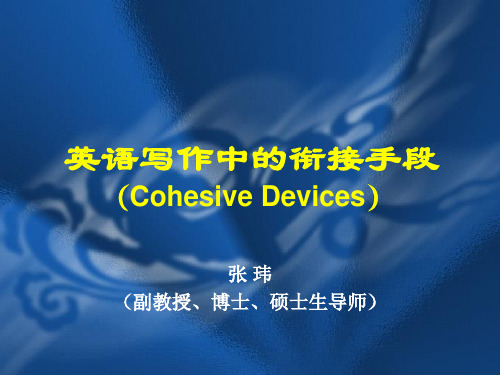
too. John smokes a lot . Does his father do so?
在汉语的动词性替代中 , 最常见的替代词为“来” 。此外,
“干” 字也有替代功能。请分别看下列例句:
黛玉 …… 便说道: “你既这么说 ,为什么我去了你不叫丫头
开门呢 ?”宝玉诧异道: “这话从哪里说起 ? 我要是这么着立 刻就死了。 ” 曹雪芹: 《红楼梦》 “你画的不像 ,等我来。 ”
3. 比较照应 比较照应指通过形容词和副词的比较等级形式以及
其他一些有比较意义的词语 (same ,so ,as ,equal ,such ,similarly ,differently ,other , otherwise , likewise 等) 表示的照应关系。 汉语中也有类似的用法。请看下面两例句:
语法衔接
(一)照应
照应指用代词等语法手段来表示语义关系, 即
在语篇中某个名词或概念第二次或重复出现 时应使用恰当的代词或其它成份替代它。英 语中的照应主要分为 3 类: (1)人称照应; (2) 指示照应; (3)比较照应。汉语也同样可通过 人称、指示和比较手段与上下文中的某一个 参照点相呼应。
在例(1)中, 汉语中的人称代词在翻译为英语时, 被译为非限
2.指示照应 用于指示照应的词可以分为两类: 选择性名词性指示代词、
定冠词和指示性副词,如:
他用心良苦, 但那是不够的。 He has good intentions, but that is not enough. 这鸟过去只吃小米, 不吃别的。 The bird only ate millet. 这儿的气温比台北高。 The temperature here is higher than that of Taipei.
高三英语 寒假作业 强调句替代略倒装句
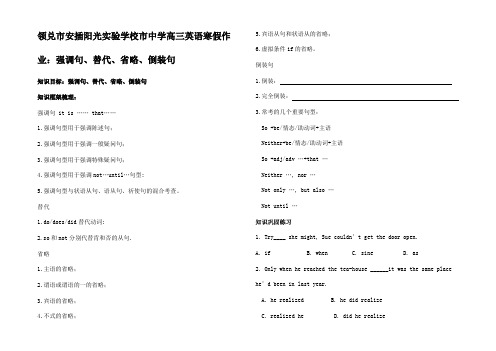
领兑市安插阳光实验学校市中学高三英语寒假作业:强调句、替代、省略、倒装句知识目标:强调句、替代、省略、倒装句知识框架梳理:强调句 it is …… that……1.强调句型用于强调陈述句;2.强调句型用于强调一般疑问句;3.强调句型用于强调特殊疑问句;4.强调句型用于强调not…until…句型;5.强调句型与状语从句、语从句、祈使句的混合考查。
替代1.do/does/did替代动词;2.so和not分别代替肯和否的从句.省略1.主语的省略;2.谓语或谓语的一的省略;3.宾语的省略;4.不式的省略;5.宾语从句和状语从的省略;6.虚拟条件if的省略。
倒装句1.倒装:2.完全倒装:3.常考的几个重要句型:So +be/情态/助动词+主语Neither+be/情态/助动词+主语So +adj/adv …+that …Neither …, nor …Not only …, but also …Not until …1. Try____ she might, Sue couldn’t get the door open.A. ifB. whenC. sineD. as2. Only when he reached the tea-house ______it was the same place he’d been in last year.A. he realizedB. he did realizeC. realized heD. did he realize3. —It’s nice. Never before____ such a spe cial drink! —I’m glad you like it.A.I have hadB. I hadC. have I hadD. had I4. Was it on a lonely island ______ he was saved one month after the boat went down?A. whereB. thatC. whichD. what5.It is not how much we do but how much love we put into what wedo_____benefits our work most. A. who B. which C. that D. what 6. —Have you seem the film Under the Hawthorn Tree?— Of course, I have. It was in our village _______ it was made.A. thatB. whereC. whenD. which7. It’s not what we do once in a while ______ shapes our lives, but what we do consistentlyA .which B. that C. how D. when 8. Jane won’t join us for dinner tonight and .A. neither won’t TomB. Tom won’t eitherC. Tom will tooD. so will Tom9.It sounds like something is wrong with the car’s engine._______, we’d better take it to the garage immediately.A. OtherwiseB. If notC. But for thatD. If so10._____ a strange plant! I've never seen it before. A. Which B. What C. How D. Whether 11.It doesn’t matter if they want to come to your party, _______?A. doesn’t itB. does itC. don’t theyD. do they12. I have seldom seen my mother _______ pleased with my progress as she is now .A. soB. veryC. tooD. rather13. It was from only a few supplies that she had bought in the village _______ the hostess cooked such a nice dinner. A. whereB. thatC. whenD.which14.—Who should be responsible for the accident?—The boss, not the workers. They just carried out the order .A. as toldB. as are toldC. as tellingD. as they told15. John’s success has nothing to do with good luck. It is yearsof hard work has made him what he is today.A. whyB. whenC. whichD. that16. Little about her own safety, though she was in great danger herself.A. did Rose careB. Rose did careC. Rose does careD. does Rose care17. —Is everyone here?—Not yet……Look , there_______ the rest of our guests!A. comeB. comesC. is comingD. are coming18. If you have a job, yourself to it and finally you’ll succeed.A. do devoteB. don’t devoteC. devotingD. not devoting19. We laugh at jokes, but seldom about how they work.A. we thinkB. think weC. we do thinkD. dowe think20 John opened the door . There _____ he had never seen before.A. a girl did standB. a girl stoodC. did a girl standD. stood a girl21.—I wonder ________ you’ll water t his kind of flower.—Every other day.A. how oftenB. how longC. how soonD. how much22. Not until he left his home ______ to know how important the family was for him.A had he begunB did he beginC he beganD he had begun23. At the meeting place of the Yangtze River and the JialingRiver______, one of the ten largest cities in China.A. lies ChongqingB. Chongqing liesC. does lie ChongqingD. does Chongqing lie24. a certain doubt among the people as to the practical value of the project.A. It hasB. They haveC. It remainsD. There remains25. For a moment nothing happened. Then all shouting together.A. voices had comeB. came voicesC. voices would comeD. did voices come26. Every evening after dinner, if not from work, I willspend some time walking my dog. A. being tired B.tiring C. tired D. to be tired27. You and I could hardly work together, ?A. could youB. couldn’t IC. couldn’t weD. could we28. According to statistics, a man is more than twice as likely to die of skin cancer _________ a woman.A. thanB. suchC. soD. as29. The computer was used in teaching. As a result, not only________, but students became more interested in the lessons.A. saved was teachers’ energyB. was teachers’ energy savedC. teachers’ energy was savedD. was saved teachers’ energy30. So sudden ________that the enemy had no time to escape.A. did the attackB. the attack didC. was the attackD. the attack was第一节:完形填空You are travelling on an ocean ship when, suddenly a giant wave causes the ship to overturn. Hundreds of people die 21 , but you and several others 22 in the ballroom. Would you stay there and 23 for help? Or would you try, 24 the danger, to find your way out of the ship?This is the 25 faced by the characters in the film “Poseidon”.Trapped in the ballroom of the overturned ship, the 26 orders the surviving guests to wait for help. A small group of people 27 to accept this fate. They try to escape, knowing that there will be no way back 28 the captain locks the doors behind them.At the time of the disaster, each of the characters is trying to overcome personal problems in their own lives. All must face their 29 and make life and death decisions.Architect Richard Nelson is preparing to kill himself when the wave hits. He feels depressed over the 30 of his relationship with his partner. But he is forced to fight 31 his life, and learns to want to live again. He realizes he must 32 the past and not think too much about the bad.Robert Ramsey, a fireman, decides to 33 his own life so that his daughter, Jen, 34 live. He swims t o the ship’s control room 35 he must press a switch to change the direction of the ship.He knows he will likely 36 in the process, but just as surely, he knows that it’s the only way his fri ends can escape. His actions give the others a chance to reach 37 . They escape from the ship just before it 38 , killing all those waiting inside and Jen’s father as well. All the characters who survive feel 39 to be alive, but they are also aware that their own 40 , bravery and determination saved their own lives.21. A. gradually B. immediately C. finally D. individually22. A. stay B. dance C. survive D. live23. A. ask B. cry C. wait D. demand24. A. despite B. in C. with D. except25. A. position B. dilemma C. danger D. scene26. A. director B. passenger C. sailor D. captain27. A. refuse B. agree C. hesitate D. dislike28. A. unless B. until C. once D. when29. A. death B. survival C. courage D. fears30. A. end B. departure C. failure D. difficulty31. A. against B. for C. with D. over32. A. let alone B. let out C. let go of D. let down33. A. give out B. give away C. give in D. give up34. A. might B. can C. would D. must35. A. which B. there C. where D. then36. A. succeed B. fail C. survive D. drown37. A. home B. safety C. success D. destination38. A. breaks B. explodes C. sinks D. overturns39. A. relieved B. lucky C. relaxed D. happy40. A. choices B. calmness C. fortune D. confidence第二节:阅读理解AThe booking notes of the play “the Age of Innocence”:Price: $10BOOKINGThere are four easy ways to book seats for performance:------ in personThe Box Office is open Monday to Saturday, 10 a. m. -8 p. m.------ by telephoneRing 01324976 to reserve your tickets or to pay by credit card (Visa, MasterCard and Amex accepted)------ by postSimply complete the booking form and return it to Global Theatre Box Office.------ on lineComplete the on-line booking form at www. Satanfiedtheatre. comDISCOUNTS:Saver: $2 off any seat booked any time in advance for performances from Monday to Thursday. Savers are available for children up to 16 years old, over 60s and full-time students.Supersaver: half-price seats are available for people with disabilities and one companion. It is advisable to book in advance. There is a maximum of eight wheelchair spaces available and one wheelchair space will be held until an hour before the show.Standby: best available seats are on sale for $6 from one hour before the performance for people eligible(suitable)for Saver and Supersaver discounts and thirty minutes before for all other customers.Group Bookings: there is a ten percent discount for parties of twelve or more.School: school parties of ten or more can book $6 standbytickets in advance and will get every tenth ticket free.Please note: we are unable to exchange tickets or refund money unless a performance is cancelled due to unforeseen circumstances.41. If you want to book a ticket, you CANNOT ________.A. use the Internet.B. ring the booking number and pay for the tickets by credit card.C. go to the Box Office on Sundays.D. complete a booking form and post it to the Box Office.42. According to the notes, who can get $2 off?A. A 20-year-old full-time college student.B. A 55-year-old woman.C. An 18-year-old teenager.D. The people who book the tickets on Fridays.43. If you make a group booking for a group of 14 adults, how much should you pay?A. $120B. $126C. $140D. $15044. From the passage we can know all the following information except that ________.A. There are only 8 wheelchair spaces in the theatre.B. The audience can’t refund money if the performance is on show.C. A group of 12 persons can get 10 percent discount.D. A school party of 15 students should pay $90 for the standby tickets.45. What kind of tickets are the cheapest?A. The standby tickets.B. The standby tickets for school parties of ten or more.C. The tickets for Saver discount.D. The tickets for group booking.BFrom the health point of view we are living in an amazing age. We are free from many of the most dangerous diseases. A large number of once deadly illnesses can now be cured by modern medicine. It is almost certain that one day medicines will be f ound for the most stubborn remaining diseases. The expectation of life has increased greatly. But though the possibility of living a long and happy life is greater than ever before, every day we witness the unbelievable killing of men, women and children on the roads. Manvs the motor-car. It is a never-ending battle which man is losing. Thousands of people the world over are killed or horribly killed each year and we are quietly sitting back and letting it happen.It has been rightly said that when a man is sitting behind a steering wheel (方向盘), his car becomes the extension of his personality. There is no doubt that the motor-car often brings out a man’s very worst qual ities.People who are normally quiet and pleasant may become unrecognizable when they are behind a steering-wheel. They say, they are ill-mannered and aggressive, willful as two-year-olds and completely selfish.All their hidden angers and disappointments seem to be brought to the surface by the act of driving.The surprising thing is that society smiles so gently on the motorist and seems to forgive his behavior. Everything is done for his convenience. Cities are allowed to become almost uninhabitable because of heavy traffic; towns are made ugly by huge car parks; the countryside is ruined by road networks; and the deaths become nothing more than a number every year, to be easily forgotten.It is high time a world rule was created to reduce this senseless waste of human life. With regard to driving, the laws of some countries are unbelievably lax (不严格) and even the strictest are not strict enough. A rule which was universally accepted could only have an obviously beneficial effect on the accident rate.Here are a few examples of some of the things that might be done. The driving test should be standardized and made far more difficult than it is; all the drivers should be made to take a test every three years or so; the age at which young people are allowed to drive any vehicle should be raised to at least 21; all vehicles should be put through strict tests for safety each year. Even the smallest amount of alcohol in the blood can damage a person's driving ability. Present drinking and driving laws (where they exist) should be made much stricter. Speed limits should be required on all roads. Governments should lay down safety specifications for car factories, as has been done in the USA. All advertising stressing power and performance should be banned. These measures may not sound good enough. But surely nothing should be considered as too severe if it results in reducing the number of deaths. After all, the world is for human beings, not motor-cars.46. What is the main idea of this passage?A. Traffic accidents are mainly caused by motorists.B. Thousands of people the world over are killed each year.C. Only stricter traffic laws can prevent accidents.D. The laws of some countries about driving are too lax.47. What does the author think of society toward motorists?A. Society laughs at the motorists.B. Society forgives their rude driving.C. Victims of accidents are nothing.D. Huge car parks are built in the cities and towns.48. What does the author mean by saying “his car bec omes theextension of his personality” in Para. 2 ?A. Driving can represent his manners.B. Driving can show the other part of his personality.C. Driving can bring out his character.D. Driving can show his hidden qualities.49. Which of the followings is NOT mentioned as a way against traffic accidents?A. Test drivers every three years.B. Stricter driving tests.C. Build more highways.D. Raise age limit and lay down safety specifications.50. The author’s attitude towards the present traffic situation is ________.A. unsatisfiedB. positiveC. appealingD. unclear。
英语中的省略和替代

(3) Should there be a flood, what should we do?
(If there should be a flood)
整理课件
17
5. 英语中有一些固定的省略结构: 在以if, when, though, as if (好象)等连词引导 的从句中, 如从句中的主要动词是be, 常将主语 it 和动词be 省略。 If it is necessary, we shall send a telegram home. 如有必要, 我们就往家里打电报。 Whenever it is possible, he will come to my help. 他一有可能就来帮助我。
1) 并列的不定式可省去后面的 to.
I told him to sit down and wait for a moment. 2) help 当“帮助”讲时, 后面的宾语或宾补的
不定式符号to可带可不带。
I will help (to) do it for you.
I will help you (to) do it. (3) 介词but前若有动词do, 后面的不定式不带
整理课件
4
简单句中的省略
1. 省略主语: 祈使句中的主语通常被省略; 其他省略的主语的情况多限于少数现成的说法。
(1) (You) Come in, please.
(2) ( I ) See you tomorrow.
(3) ( I ) Thank you for your help.
(4) ( I ) Beg your pardon.
高三英语二轮专题复习1-13省略、替代、强调及其他特殊句式

第1章专题13省略、替代、强调及其他特殊句式1.(2011·重庆卷,28)I told them not everybody could run as fast as you did, ________?A.could he B.didn't IC.didn't you D.could they答案:B。
本题考查反意疑问句。
句意:我告诉他们并不是所有的人都和你跑得一样快,是吗?主从复合句变反意疑问句时,反问部分与主句一致。
故B项正确。
2.(2011·重庆卷,32)—Have you seen the film Under the Ha w thorn Tree?—Of course, I have. It was in our village ________ it was made.A.that B.whereC.when D.which答案:A本题考查强调句型。
句意:——你看过电影《山楂树之恋》吗?——当然看过,就在我们的村庄拍摄的。
其结构为:It is/was+被强调部分+that+其余部分。
此处强调地点状语。
3.(2011·山东卷,23)Find ways to praise your children often,________ you'll find they will open their hearts to you.A. tillB. orC. andD. but答案:C。
本题考查连词的用法。
句意:找到经常表扬孩子的方法,你就会发现孩子们就会对你敞开心扉。
本句为“祈使句+and+简单句”,祈使句可转化为if引导的条件句。
4.(2011·江苏卷,33)It sounds like something is wrong with the car's engine.________,we'd better take it to the garage immediately.A. OtherwiseB. If notC. But for thatD. If so答案:D。
英语中的省略

3. 介词的省略(固定结构) All (of) the films are very interesting. Both (of) the twins are very clever. The heavy rain lasted (for) two hours. We consider her (as) our mother. Trees can prevent the earth (from) being washed away. Many people have difficulty/trouble/problems (in) reading the classics. He spent a whole day (in) working out the maths problem.
③状语从句中,主从句主语一致或it主语,be动词作谓语, 可省略主语和be动词。★ I won’t go to the party unless (I am) invited. He made the acquaintance of his wife while (he was) working in Shanghai. Though (he was) tired, he he didn’t stop at all. If (it is) possible, come and see me next Friday. You can take down some key words if (it is) necessary. ④有时,从句中可以省略与主句重复的谓语动词 She often writes her homework faster than I (write). We will do all we can (do) to save the boy.
英语语法:替代
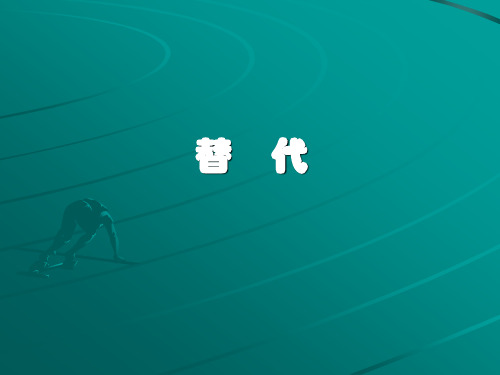
带后置修饰语的替代词one/ ones也常见于比 带后置修饰语的替代词one/ ones也常见于比 较分句中。例如: 较分句中。例如: Our new cassette is more expensive than the one we had before. before. I like this picture better than the one you showed me yesterday. 替代词one/ ones 在形容词比较级 在形容词比较级、 替代词 one/ ones在形容词比较级 、 最高级以 及某些限定词如this, which, 及某些限定词如this, which,序数词等之后可以 省略。例如: 省略。例如: I want the fifth volume, not the fourth (one). (one). If I miss the 9:15 train, I’ll catch the next (one). (one). The second chapter is much longer than the first (one). (one).
1)替代词one/ ones只能替代单数/复数可数名 替代词one/ ones只能替代单数 只能替代单数/ 词。例如: 例如: There are good films as well as bad ones. (ones = ones. films) They sent us a lot of small apples instead of big ones. ones. (ones = apples) 如果名词词组中心词是不可数名词, 如果名词词组中心词是不可数名词 , 就不 能用one/ ones替代 要避免重复, 替代, 能用one/ ones替代,要避免重复,通常采用名词 性省略: 性省略: We prefer green tea to black (tea). (tea). I like fresh candy better than stale (candy). (candy).
【绝对精品】英语语法23-替代和省略-Substitution and Ellipsis
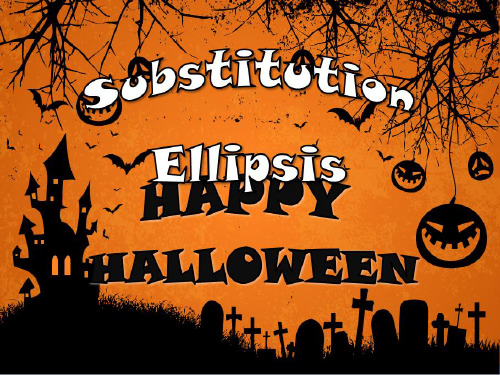
Uses of one/ ones as Substitutes
1
Judy broke the coffee-pot, so she has to
buy another (one).
Some of your answers were correct, but
5
2 I can’t remember which (ones).
• I need this dictionary, but I
can’t afford it. (specific
3
reference)
• I need a good dictionary, but
Generic reference I can’t afford one. (generic
reference)
I can’t write properly with your pen; I’d rather use my own.
You have four children. I have only two.
Uses of one/ ones as Substitutes
1 2
Compare: • I need this dictionary, but I can’t afford that. (specific reference)
Uses of one/ ones as Substitutes
1 To replace a countable noun or noun phrase, for personal as well as non-personal reference.
The new design is much better than the old one.
答英语中的省略有两种一是替代省略,即用其他词代替句

答:英语中的省略有两种:一是替代省略,即用其他词代替句子中重复或相同的部分;二是结构省略,即根据语境需要,承前或后省略句子中相同的某些句子成分。
这类题型在历届高考试题中屡见不鲜。
一、替代省略1.用it, one, that替代句子中重复出现的名词、代词或句子。
one是指代同名称的另一样东西(同类异物),代替前面句子中重复出现的可数名词;that 替代特指可数或不可数名词,后面常跟有in或of短语作后置定语;it指代同名称的同样事物(同类同物)。
[考例]1) Meeting my uncle after all these years was an unforgettable moment, ______ I always treasure.A. thatB. oneC. itD. what析:正确答案是B.one代替泛指的an unforgettable moment, 在句中作同位语,起补充说明的作用。
I will always treasure是定语从句修饰one.2) -Why don't you take a break?-Didn't we just have _____?A. itB. thatC. oneD. this析:由题干分析,代词指代的是前面的a break,为单数泛指概念,故答案为C.one代替泛指的单数名词,相当于“a / an+单数名词”。
若替代前面提到的泛指复数名词要用ones,替代特指复数名词则用those或the ones.3) Equipped with modern facilities, today's libraries differ greatly from ________.A. those of the pastB. the pastC. which of the pastD. these past析:答案是A.those代替the libraries.2.在两个分句中,当两者(人或物)情况或意思完全相同,第二个分句用so, neither, nor, either等引出时,出现省略现象,其中neither, nor, so还可引起倒装结构,表示“也不……”、“也……”。
英语中的省略现象

省略结构
1.省略的前提条件是必须保持句子意思的完成无缺,不能引起争议和歧义
2.省略往往是为了避免重复,可以承接前面的内容省略(承前省略),有的可以承接后文的内容省略(后指省略)。
He is not only a teacher of English, but also of Chinese. (of 前省略了a teacher)
3.省略的部分要能够“还原”,还原后语法上要求结构对应,逻辑关系正确。
4.定语从句的省略
5.状语从句的省略
标准书面语中,状语从句的省略:表示转折、时间、条件的连词+ 形容词短语/分词短语
错误形式:连词+ 介词短语/名词短语
特例:once 可以加介词短语/名词短语,whatever 可以加名词短语构成状语从句省略。
IF+
6.比较结构中的省略
7.并列结构中的省略
1)省略相同的主语,宾语,连系动词,助动词和情态动词
2)两个句子并列,第一个句子含有be 动词或者become, 第二个句子中的be 动词或become 必须省略,同时,一些重复的名词或形容词也必须省略。
8.习惯性省略
As needed; as planned; as required; as scheduled
Whenever necessary/needed/possible; wherever necessary/needed/possible than ever; than before; than ever before; than usual; than expected;。
英语中常见的省略
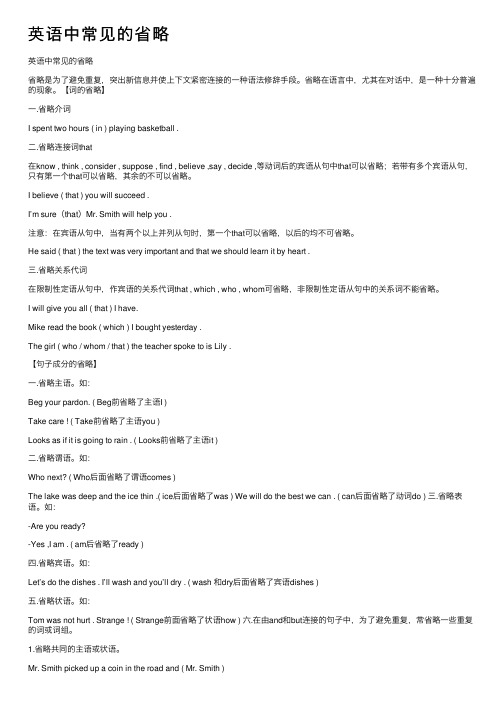
英语中常见的省略英语中常见的省略省略是为了避免重复,突出新信息并使上下⽂紧密连接的⼀种语法修辞⼿段。
省略在语⾔中,尤其在对话中,是⼀种⼗分普遍的现象。
【词的省略】⼀.省略介词I spent two hours ( in ) playing basketball .⼆.省略连接词that在know , think , consider , suppose , find , believe ,say , decide ,等动词后的宾语从句中that可以省略;若带有多个宾语从句,只有第⼀个that可以省略,其余的不可以省略。
I believe ( that ) you will succeed .I’m sure(that)Mr. Smith will help you .注意:在宾语从句中,当有两个以上并列从句时,第⼀个that可以省略,以后的均不可省略。
He said ( that ) the text was very important and that we should learn it by heart .三.省略关系代词在限制性定语从句中,作宾语的关系代词that , which , who , whom可省略,⾮限制性定语从句中的关系词不能省略。
I will give you all ( that ) I have.Mike read the book ( which ) I bought yesterday .The girl ( who / whom / that ) the teacher spoke to is Lily .【句⼦成分的省略】⼀.省略主语。
如:Beg your pardon. ( Beg前省略了主语I )Take care ! ( Take前省略了主语you )Looks as if it is going to rain . ( Looks前省略了主语it )⼆.省略谓语。
大学生英语替代和省略的使用特征研究
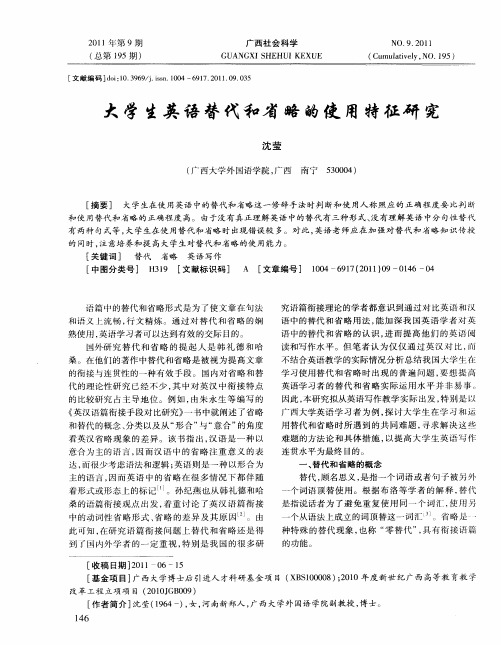
的 同时 , 注意培 养和提 高大 学生 对替代 和 省略 的使 用 能力 。
[ 关键 词 ] 替代 省略 英语 写作
[ 图分类 号 ] H 1 [ 献标 识码 ] A [ 中 39 文 文章 编 号 ] 10 04—6 1 2 1 )9— 16~ 4 97(0 1 0 0 4 和省 略 的使用 特征 研究
二、 替代 和 省 略的分 类 根 据韩礼 德 和 哈桑 的观 点 , 篇 中 的非 结 构 性 语 衔 接特 征 即具有 语义 衔接 作用 的语 法 与词 汇 手 段共
( a e e mbr se yn nin o n S M r gt v r e a asdia oemet s h ’ y s y fn o J
语 篇 中的替 代 和省 略形 式 是 为 了使 文 章 在句 法 和语 义 流 畅 , 文 精 炼 。通 过 对 替 代 和 省 略 的娴 行 熟 使用 , 语学 习者 可 以达 到有效 的交 际 目的。 英 国外研 究 替 代 和 省 略 的 提 起 人 是 韩 礼 德 和 哈
究语 篇衔 接理 论 的学者 都 意识 到 通过 对 比英 语 和汉 语 中 的替 代 和 省 略 用 法 , 加 深 我 国英 语 学 者 对 英 能 语 中的替 代 和 省 略 的 认 识 , 而提 高 他 们 的英 语 阅 进 读和 写作 水 平 。但 笔 者 认 为 仅 仅 通 过 英 汉 对 比 , 而 不结 合英 语教 学 的实 际情 况分 析 总 结我 国大 学 生 在 学 习使 用替 代 和 省 略 时 出现 的普 遍 问题 , 想 提 高 要
nm ) a e.
此句 中 的 w y后 面 省 略 了句 子 Ma e e h y r gt vr s y
英语中“替代”的用法分析总结-精选范文
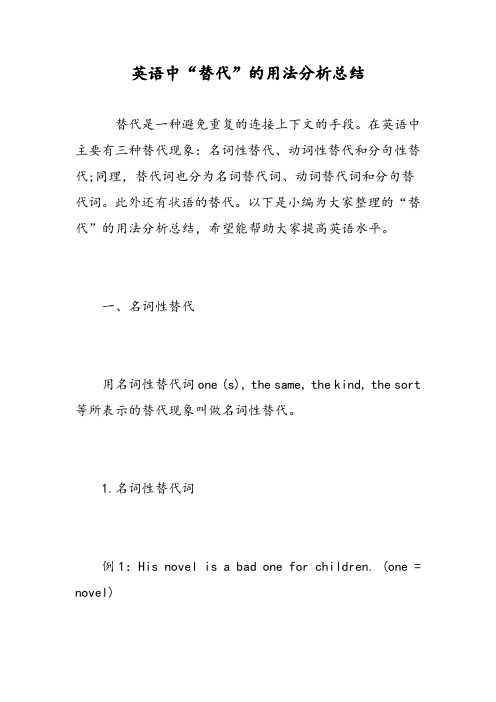
英语中“替代”的用法分析总结替代是一种避免重复的连接上下文的手段。
在英语中主要有三种替代现象:名词性替代、动词性替代和分句性替代;同理,替代词也分为名词替代词、动词替代词和分句替代词。
此外还有状语的替代。
以下是小编为大家整理的“替代”的用法分析总结,希望能帮助大家提高英语水平。
一、名词性替代用名词性替代词one (s), the same, the kind, the sort 等所表示的替代现象叫做名词性替代。
1.名词性替代词例1:His novel is a bad one for children. (one = novel)例2:The child doesn’t like this book. Show him a more interesting one. (one = book)2.某些不定代词在名词性替代中还可以用一些不定代词来替代。
如all, both, some, any, enough, several, none, many, much, more, (the ) most, (a) few, another, the other, others, either等。
例如:I don't want any more food. I’ve had enough.3. one 和 ones是最常见的替代词one的复数形式是ones.one 和ones作为替代词只能用以替代可数名词,不可用来替代不可数名词。
例如:1)The grey horse is stronger than the black one.2)The new design is much better than the old ones.4.名词性物主代词mine,yours名词性物主代词mine, yours等可用来代替my +名词,your +名词等,例如:“Whose is that coat?” “It’s mine.”二、动词性替代用动词替代词do,do so等所表示的替代现象叫做动词性替代。
省略英语怎么说

省略英语怎么说省略,指免去,除去。
在一定条件下省去一个或多个句子成分;为了表达的简捷,省去话中可以省去的字句,有不说可明白时的省笔,有扼要概括的略写,具体分为蒙上省略、探下省略和语急省略。
那么,你知道省略的英语怎么说吗?省略的英文释义:omissionellipsisunderstandpreteritionpass overomit省略的英文例句:省略符号一标记,通常为破折号(—),指一个单词或字母的省略A mark, usually a dash(postman中的t可以省略不读。
The `t' in `postman' may be elided.省略号标识省略部分内容。
Ellipses indicate nonessential information omitted from examples.最后一个部分省略,最后一个“=”也可以省略。
Trailing null component groups and their delimiters may be omitted.省略符号在写作中使用来表示省略。
Ellipsis is used in writing to indicate an omission.你可以在方法主体只有一个表达式的时候省略大括号。
You can omit the braces if the method body has just one expression.在没有实际参数时,可以省略括号。
When there are no actual arguments then the parentheses can be omitted.两个或多个单词省略或组合后形成的单词。
A word formed from two or more words by omitting or combining some sounds.他说话时把一些词语省略了。
He clipped his words when speaking.美国的评审员省略了这种程序。
高考英语语法省略与替代
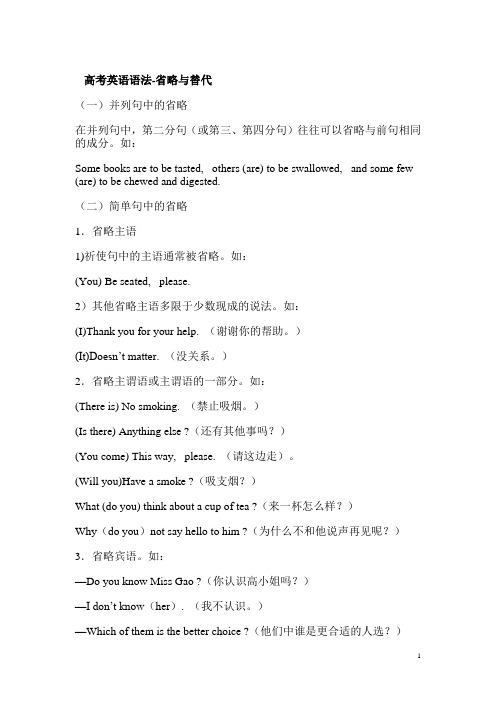
高考英语语法-省略与替代(一)并列句中的省略在并列句中,第二分句(或第三、第四分句)往往可以省略与前句相同的成分。
如:Some books are to be tasted, others (are) to be swallowed, and some few (are) to be chewed and digested.(二)简单句中的省略1.省略主语1)祈使句中的主语通常被省略。
如:(You) Be seated, please.2)其他省略主语多限于少数现成的说法。
如:(I)Thank you for your help. (谢谢你的帮助。
)(It)Doesn’t matter. (没关系。
)2.省略主谓语或主谓语的一部分。
如:(There is) No smoking. (禁止吸烟。
)(Is there) Anything else ?(还有其他事吗?)(You come) This way, please. (请这边走)。
(Will you)Have a smoke ?(吸支烟?)What (do you) think about a cup of tea ?(来一杯怎么样?)Why(do you)not say hello to him ?(为什么不和他说声再见呢?)3.省略宾语。
如:—Do you know Miss Gao ?(你认识高小姐吗?)—I don’t know(her). (我不认识。
)—Which of them is the better choice ?(他们中谁是更合适的人选?)—Well, it’s hard to tell(it). (哟,这很难说。
)4.省略表语。
如:—Are you thirsty ?(你渴吗?)—Yes, I am(thirsty). (是的,我渴。
)5.同时省略几个成分。
如:—Are you feeling better now ?(你觉得好些吗?)—(I am feeling)Much better(now). (好多了。
(完整版)英语省略句的六大总结

英语中的六大省略现象概念:为了避免重复,省略句中的一个或几个句子成分,这种语法现象称为省略1. 简单句中的省略现象(6)名词所有格修饰的名词若表示店铺、 住宅、 教堂或上下文已暗示或明确指出过 的事物。
例如:例:( 1)在对话中,例如:— How is your mother today?— (She is) Much better.(2) 在祈使句中,例如: (You) Open the door, please!(3) 在感叹句中,例如: What a (good) boy (he is)! How (hard) they are working!( 4)表示讲话人的意见和看法, (It) sounds fine to me.(It's a) pity you couldn't come.(5)提问,例如: (Is there) anything wrong? (Have you)found the treasure? 你妈妈今天怎样? 她)好多了。
请开门!多好的男孩啊!他们工作得多努力呀!上下文意思很清楚,例如:你不能来,真遗憾。
发生了什么事吗?你已经找到珠宝了吗? at her mother's (house)在她妈妈家里 at the doctor's (house)在医院里 at the barber's (shop)在理发店里 at the tailor's (shop) 在裁缝店里(7)动词不定式的省略。
式符号 前面出现过的动词在下文再次出现时, to 。
动词不定式的省略,一般只省略动词,而保留符号“ 可以单纯使用不定 to ”。
例如:—Will you go with me? 你愿意跟我一块去吗?—Well, I'd like to(go with you). 我非常愿意。
I'd like to. 也可用I'd love to. /I'd be happy to. 来取代。
- 1、下载文档前请自行甄别文档内容的完整性,平台不提供额外的编辑、内容补充、找答案等附加服务。
- 2、"仅部分预览"的文档,不可在线预览部分如存在完整性等问题,可反馈申请退款(可完整预览的文档不适用该条件!)。
- 3、如文档侵犯您的权益,请联系客服反馈,我们会尽快为您处理(人工客服工作时间:9:00-18:30)。
2. 句子成分的省略
省略前提: 主谓宾, 定状表, 如有重复可删掉。 省略原则: 词语省略后, 不致令人费解。 省略类型:
1. 心照不宣型(用于祈使句和某些现成的简单句中); 2. 承前省后型(用于对话、并列句和动词不定式中); 3. 可有可无型(用于宾从中的that、定从中作宾语 的whom, which, that和某些状从中) 4. 虚拟倒装型(只用于需要倒装的虚拟条件句中)。
(5) (You come) this way, please.
3. 省略宾语:可省略宾语的全部; 可省略作宾语
的动词不定式, 只保留to, 但如果该宾语是动词
be或完成时态, 则须在to后加上be或have。
(1) ---Do you know Miss Hu? ---I don’t know (her). (2) Don’t touch anything unless the teacher tells you to (touch). (3) ---Are you a teacher? ---No, but I want to be (a teacher). (4) ---He hasn’t finished the task. ---Well, he ought to have (finish it).
5) 主语从句中有动词do, 后面作表语的不定式
的to可带可不带。
What we can do now is (to) wait.
6) find 当“发现”讲时,后面作宾语补足语的
不定式符号to可带可不带。
We found him (to) work very hard at the
experiment.
Exercise
1. She can swim under water longer than I can swim under water. 2. They discussed whether they should stay in the house or they should try the open air. 3. They had a meal, they went out for a walk and then they came back to sleep. 4. Don’t bathe if you don’ to bathe. 5. I don’t visit my parents as much as I ought to visit my parents.
5. 英语中有一些固定的省略结构: 在以if, when, though, as if (好象)等连词引导 的从句中, 如从句中的主要动词是be, 常将主语 it 和动词be 省略。 If it is necessary, we shall send a telegram home. 如有必要, 我们就往家里打电报。 Whenever it is possible, he will come to my help. 他一有可能就来帮助我。
--- (I’m feeling) better (now).
(2) (I wish) Good luck (to you)!
(3) Let’s meet at the school gate as the
same as (we met) yesterday.
并列句中的省略
两个并列分句中, 后一分句常省略与前一分句 中相同的部分。
mother was (at home).
主从复合句中的省略
1. 主句中有一些主谓被省略 (1) (I’m) Sorry to heat that you are ill. (2) (It’s) a pity that you missed such a good chance. 2. 省略从句中与主句相同的部分 They do not visit their parents as much as they ought to (visit their parents). 3. 主句与从句各有一些成分被省略 The sooner (you do it) , the better (it will be).
Exercise
1. I Haven’t seen you for ages. 2. It Sounds like a good idea. 3. I am Sorry to hear that. 4. Walk this way, please! 5. Would you like Joining us for a walk? 6. Would you like Some more tea? 7. It Doesn’t matter. 8. It is a Pity you couldn’t come. 9. What/Such Terrible weather! 10. Are you Going to the supermarket?
Notes
1. 省略句可同时省掉句子几个成份 What exciting news! (= What exciting news it is!) 多么令人激动的消息啊! Pity he’s failed. (= It is a pity that he’s failed.) 很遗憾, 他失败了。 I like him more than her. (= I like him more than I like her.) 我喜欢他更甚于喜欢她。
3. 不定式符号to的省略
1) 并列的不定式可省去后面的 to. I told him to sit down and wait for a moment.
2) help 当“帮助”讲时, 后面的宾语或宾补的
不定式符号to可带可不带。
I will help (to) do it for you.
I will help you (to) do it.
Ellipsis
读下列句子, 说你的感觉。
1. This radio works well , but that one doesn’t work well . 2. When water is pure, water is a colorless liquid. 3. Are you ready? Yes, I am ready .
其他省略
1. 连词that的省略
(1)宾语从句中常省略连词that.
I know (that) he is a student.
(2) 在定语从句中, that在从句中作宾语时可省略。另外,
凡是进行时态和被动语态的定语从句都可省略关系代词
和be 动词。
He likes the songs (that) Andy Lau sings. He likes the songs (that are) sung by Andy Lau.
要省去 to, 但在被动语态中须将to 复原。
I saw the boy fall from the tree. The boy was seen to fall from the tree. The boss made us work 12 hours a day. We were made to work 12 hours a day.
4. 省略表语
(1) ---Are you thirsty? ---Yes, I am (thirsty). (2) His brother is lazy. Nor is his sister (lazy).
5. 同时省略几个句子成分
(1) ---Are you fell better now?
简单句中的省略
2. 省略主语或谓语的一部分
(1) (There is) No smoking. (2) (Will you) Have a smoke? (3) Why (do you) not say hello to him? (4) How (do you think) about a cup of tea?
4. He was a lover of sports as he had been a lover of sports in his youth. 5. The river was deep and the ice was thin.
t ake care! 6. You T
1. 省略句的定义
省略是为了避免重复、突出新信息并使 上下文紧密连接的一种语法修辞手段。 省略在语言中, 尤其在对话中, 是一种 十分普遍的现象。
4. 省略一个从句或从句的一部分, 可用so 或
not代替。常用于此类的动词有believe, think,
expect, guess, hope, imagine, suppose, say, tell 等以及appear, seem, afraid etc. (1) –Is he coming back tonight? --I think so. (2) –She must be busy now? --If so, she can’t go with us. (3) –Is she feeling better today? --I’m afraid not. (4) –Do you think he will attend the meeting? --I guess not.
3. 被省略的部分一般可以在句子中补上, 但 有时省略结构已经定型, 如果把省略部分补上, 反而不合乎习惯。 He is taller than I am. 他比我高。 (am之后省略tall, 补上不合习惯) No parking. 禁止停车。 (告示用语 = No parking is allowed here.) 有一些习惯表达很难补上所省略的部分: Not at all. 不用谢。 No matter. 不要紧。 Thanks. 谢谢。
简单句中的省略
